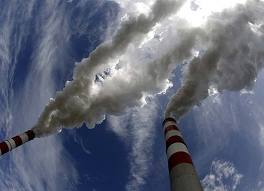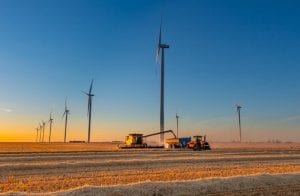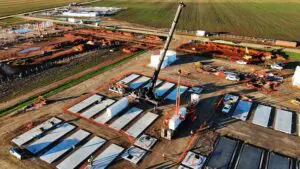Who is leading Australia’s low-carbon revolution? A team at Crikey has put together a list of the top 25 business chiefs, lawyers, bankers, regulators and bureaucrats it believes are doing the heavy lifting to shift Australia to a low-carbon economy, from its current dubious position as the world’s biggest emitter of greenhouse gases per capita.
Says Crikey‘s deputy editor Cathy Alexander, these are the people who “write the rules” and who control the green purse strings. “If you want to know what’s happening to Australia’s emissions – and how hot the world will be for your grandchildren – these are the people who know. If you want to know what’s happening to Australia’s emissions – and how hot the world will be for your grandchildren – these are the people who know.”
So who are these people – and how were they selected? “We chose people who clearly had a lot of heft behind the scenes,” Alexander told RenewEconomy in an email. “We asked the question – when big decisions are made behind closed doors, who’s involved, and who’s influenced the people who decide? We weren’t looking for the loudest voices, we were looking for the movers and shakers behind the scenes.”
Alexander said that while many companies talked themselves up on cutting emissions, it was difficult to find large companies who were going out on a limb over it. “At this stage, much of the action is in the regulatory space, so regulators and bureaucrats ranked quite highly on our top 10 list. New CEFC chief Oliver Yates and climate lawyer Martijn Wilder’s impact is pretty substantial, when you look at it – they’re at the pointy end of our top 10.”
The order of the top half of Crikey’s list – numbers one to 10 – is being revealed gradually over the next three weeks, but we do have the names. So here are the top 10, in no particular order:
Tim Flannery (scientist, writer, environmentalist and Australia’s Climate Commissioner); Anthea Harris (CEO of the Climate Change Authority); Ross Garnaut (economist and author of the government-commissioned 2008 Climate Change Review and its 2011 update), Martin Parkinson (current Treasury Secretary and inaugural Secretary of the federal Labor governmnet’s Department of Climate Change), Blair Comley (until last month, head of the Gillard government’s department of climate change and energy efficiency); Martin Green (UNSW professor and solar R&D leading light); Oliver Yates (ex-Macquarie banker and CEO of the CEFC); Andrew Grant (CEO of C02 Australia, a pioneer of Australia’s carbon credits market); Robert Hill (former Howard government minister who is now chairman of the Cooperative Research Centre for Low Carbon Living at UNSW); Martijn Wilder (head of the climate change practice at Baker McKenzie); Michael Fraser (AGL CEO); and Jane Sargison (engineer and lobbyist for emissions reductions for industry and business).
And here’s a slightly edited version of the bottom half of Crikey’s list, numbers 11-25:
11. Anna Rose
Co-founder of the Australian Youth Climate Coalition, which now has 70,000-plus members, Rose now lectures on leadership at the ANU’s Fenner School of Environment. She was mentioned by most top 10 Power Index names as being influential on the public, and on them. Is politics the next step?
12. Zhengrong Shi
This Australian citizen founded – and until recently headed up – pioneering Chinese company Suntech, which has made 25 million solar panels. Dr Shi is still with Suntech, but are his best times behind him? Solar insiders are wondering if he will come back to Australia at some point.
13. Grant King
The managing director of Australian gentailer Origin Energy, which four or five years ago was a market leader in renewable energy. Insiders say King is now working hard to dismantle the Renewable Energy Target, and Origin’s LNG projects are massive. He still has weighty influence over the policy and business of carbon – but which side is he on?
14. Heather Ridout
On the boards of both the Climate Change Authority and ClimateWorks. A respected business-savvy voice with her finger in many pies, Ridout has been quietly getting involved in carbon — although her influence may wane if the Coalition wins. Other CCA board members are also influential, particularly scientist David Karoly and chair Bernie Fraser (seen as a safe Labor-friendly face without a deep climate background).
15. Lane Crockett
The general manager of renewable energy company Pacific Hydro Australia, he is highly active in the clean energy debate; he’s also on the Clean Energy Council board.
16. Mike Fitzpatrick
A clean energy investor who also happens to be doing well out of cleantech. He runs a clean energy investment fund called 88 Ventures (he’s also involved in Rio Tinto), and has bought into Carnegie Wave Energy, fuel cells and electric buses.
17. Jillian Broadbent
Chair of the Clean Energy Finance Corporation and RBA board member, Broadbent is a well-regarded business director who has shaped the $10 billion CEFC. Broadbent wields power behind the scenes rather than in the public debate; she has left to others the task of defending the CEFC in the face of Coalition calls for it to shut down. May lose this role if the Coalition wins.
18. Paul Gilding
An interesting ex-Greenpeace figure who has plenty of traction at the board level, both here and overseas. Insiders say business chiefs don’t always act on what he says, but they do listen. Is forward-looking and seen as an “ideas person”. Writes books, gives talks, etc. Likely to be a stayer in climate.
19. Meg McDonald
The CEO of Low Carbon Australia has long been involved in the sector; was a bureaucrat negotiating the Kyoto Protocol. Has done interesting work on developing finance models to improve energy efficiency. LCAL is merging with the CEFC, so watch what McDonald does next.
20. Gail Kelly
The CEO of Westpac Bank has been active on climate change and has advocated for a carbon price when other bankers left the issue alone.
21. John Connor
CEO of the Climate Institute, lawyer and a solid pair of hands whose advocacy on climate change has been effective. While the institute is seen as Labor-leaning, Connor can get a hearing on the Coalition side too — many advocates struggle to do that. He’s involved in energy efficiency — watch for progress soon — and liaising between NGOs and government.
22. Chloe Munro
CEO and chair of the Clean Energy Regulator. Munro heads up the country’s carbon cop; implementation of the carbon price has been smooth thanks in part to solid work by the CER, which also polices the RET and the CFI.
23. Miles George
CEO of renewables company Infigen Energy. Infigen is Australia’s largest listed pure-play renewable energy group, and George is its public face.
24. Peter Yu and Joe Morrison
These two savanna burning pioneers from the North Australia Indigenous Land and Sea Management Alliance. They took their model to the latest United Nations Framework Convention on Climate Change talks at Doha. Much attention is being paid to this area. Savanna burning has just been included in the CFI, which opens a revenue stream.
25. Jonathan Jutsen
Founder of the lead climate and energy efficiency consulting firm Energetics. Jutsen is experienced and well-regarded.










